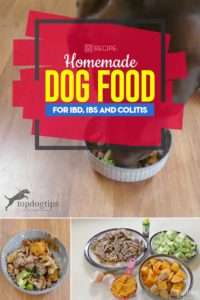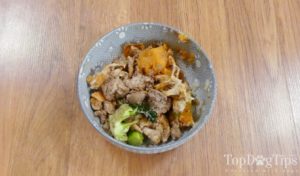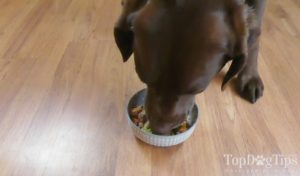Trying to care for a dog with bowel problems is no fun at all.
You have to watch your dog lie there feeling uncomfortable and sometimes in pain.
Dogs suffering from these types of health problems will most certainly need veterinary attention.
And it's likely that you'll have to change Fido's diet.
Perhaps this homemade dog food for IBD, IBS, and Colitis will be a good fit for your beloved companion.
Of course, all of these conditions are different.
While they all affect the bowels of your dog, their symptoms and severity differ.
For this reason, it's important to have your dog evaluated by a veterinarian and check with them to ensure this food will meet your dog's unique nutritional needs.
Irritable Bowel Syndrome (IBS) is known as a functional disorder.
is known as a functional disorder.
Basically, the digestive tract looks normal but doesn't work as it should.
Symptoms include abdominal pain, diarrhea, and/or constipation.
With lifestyle and dietary changes, this condition can usually be easily managed.
Irritable Bowel Disease (IBD), on the other hand, can cause irreversible damage to your dog's bowels.
The symptoms are also more severe, including painful abdominal cramping, fever, and bloody diarrhea.
The symptoms can be chronic or intermittent.
Colitis is the term used to describe inflammation of the large intestine.
The most common symptom is frequent and very loose (almost liquid) diarrhea.
It can be caused by stress, trauma, parasites, infection, or even allergies.
The cause of Colitis will determine how it is treated, but veterinarians often recommend a diet similar to this homemade dog food for IBD, IBS, and Colitis.
MORE: Dog Has Diarrhea? 9 Ways To Prevent and Treat It
Homemade Dog Food for IBD, IBS, and Colitis
 Ingredients
Ingredients
- 1 lb. boneless, skinless chicken thighs or breast
- 3 ounces of chicken liver
- 1 lb. sweet potato with skin
- 1/2 lb. broccoli stalks
- 1/2 cup canned pumpkin
- 2 eggshells
- 1/4 tsp. iodized salt
- 5 drops of Vitamin E
Directions
If your dog suffers from a bowel disorder, you MUST check with your veterinarian before switching his diet.
Your veterinarian can make recommendations for the best commercial food for your pet based on his age, weight, activity level, and health condition.
 If you want to provide your dog with homemade dog food for IBD, IBS, and Colitis, ask your veterinarian before starting Fido on this recipe.
If you want to provide your dog with homemade dog food for IBD, IBS, and Colitis, ask your veterinarian before starting Fido on this recipe.
They will likely recommend feeding your pooch a diet that is high in fiber and hypoallergenic.
Your vet may also recommend adding a pre-and/or probiotic or other supplements to this dog food for colitis.
The first step to preparing this recipe is to cook the chicken thighs and chicken liver.
I cook them together in a skillet over low/medium heat.
You'll also need to bake or microwave the sweet potato.
Keep the skin on, and cut the sweet potato into bite-sized pieces that are appropriate for your dog.
 Steam or boil the broccoli stalks until softened. Now, mix all of the ingredients together in a medium-sized bowl.
Steam or boil the broccoli stalks until softened. Now, mix all of the ingredients together in a medium-sized bowl.
The recommended serving size for this homemade dog food for IBD, IBS, and Colitis is about a 1/2 cup for every 25 pounds of body weight per serving.
You'll need to feed 2 servings per day. For example, if your dog weighs 50 pounds, he would need 1 cup of food in the morning and 1 cup at night.
You can store leftovers in the refrigerator for 5-7 days. You can also make this food in bulk and store it in the freezer for 2-3 months.
Homemade Dog Food for IBD, IBS, and Colitis: FAQs
What should I feed my dog if he has colitis?
A bland diet is advised for dogs with digestive problems, such as colitis, to minimize inflammation and treat symptoms.
Dogs with colitis may benefit from including pumpkins in their diet. The high fiber content of pumpkin may help control bowel motions and foster a healthy digestive system.
How can I treat my dog with IBD naturally?
Healing can be improved by supplementing your dog's diet with probiotics, enzymes, glutamine, and herbs like marshmallow root.
Additionally, calendula, slippery elm, and pumpkin seeds all have anti-inflammatory characteristics that safeguard the GI tract's fragile lining.
What vegetables can a dog with IBD eat?
Vegetables that are very easy to digest and are rich in vitamins and minerals include carrots, sweet potatoes, and green beans.
A unique protein diet containing only one protein source, like duck, rabbit, hog, or lamb, would also be a great option.











